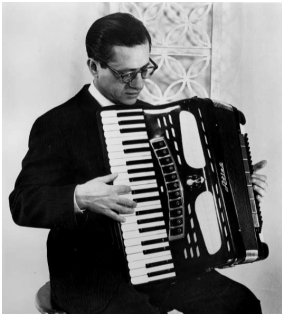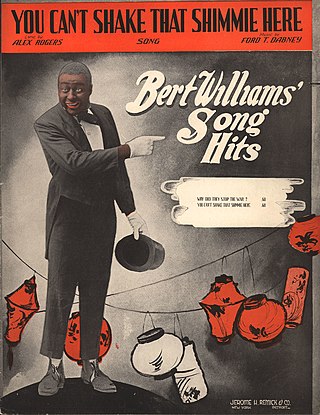Related Research Articles

Black & White Records was an American record company and label founded by Les Schreiber in 1943. It specialized in jazz and blues. When the label was sold to Paul and Lillian Reiner, it moved from New York City to Los Angeles. The catalog included music by Art Hodes, Cliff Jackson, Lil Armstrong, Barney Bigard, Wilbert Baranco, Erroll Garner, Jack McVea, and Willie "The Lion" Smith.

"Classical Gas" is an instrumental musical piece composed and originally performed by American guitarist Mason Williams with instrumental backing by members of the Wrecking Crew. Originally released in 1968 on the album The Mason Williams Phonograph Record, it has been rerecorded and rereleased numerous times since by Williams. One later version served as the title track of a 1987 album by Williams and the band Mannheim Steamroller.
Frederick L. Hemke, DMA(néFred LeRoy Hemke Jr.; July 11, 1935 – April 17, 2019) was an American virtuoso classical saxophonist and influential professor of saxophone at Northwestern University. Hemke helped raise the popularity of classical saxophone, particularly among leading American composers. He helped raise the recognition of the classical saxophone in solo, chamber, and major orchestral repertoire throughout the world. For a half century, from 1962 to 2012, Hemke was a full-time faculty music educator at Northwestern University's Bienen School of Music. In 2002, Hemke was named Associate Dean Emeritus of the School of Music. Hemke retired from Northwestern University in 2012. From the start of his career in the early 1960s, building on the achievements of earlier influential American teachers of classical saxophone — including those of Larry Teal, Joseph Allard, Cecil Leeson, Sigurd Raschèr, and Vincent Abato — Hemke helped build American saxophone repertoire through composers that included Muczynski, Creston, Stein, Heiden, and Karlins. Journalist and author Michael Segell, in his 2005 book, The Devil's Horn, called Hemke "The Dean of Saxophone Education in America." Hemke died on April 17, 2019.
Randy Edelman is an American musician, producer, and composer for film and television. He began his career as a member of Broadway's pit orchestras; he later produced solo albums for songs that were picked up by leading music performers including The Carpenters, Barry Manilow, and Dionne Warwick. He is known for his work in comedy films. He has been awarded many prestigious awards along with two nominations for a Golden Globe Award, a BAFTA Award, and twelve BMI Awards. Edelman was given an honorary doctorate in fine arts by the University of Cincinnati in 2004.

John Serry Sr. was an American concert accordionist, arranger, composer, organist, and educator. He performed on the CBS Radio and Television networks and contributed to Voice of America's cultural diplomacy initiatives during the Golden Age of Radio. He also concertized on the accordion as a member of several orchestras and jazz ensembles for nearly forty years between the 1930s and 1960s.

Squeeze Play is an Ultra High Fidelity monaural phonographic album which was released on the Dot Records label in 1956 (DLP-3024) featuring John Serry Sr. It includes an original composition by Serry, classical works, and popular music of the era. Ben Selvin serves as the musical director/producer for the album. The works were arranged by Serry and performed with his ensemble featuring two accordions, piano, guitar, bass, drum, vibes, and marimba.

"Vato" is the first single by Snoop Dogg from his album Tha Blue Carpet Treatment. The song features B-Real and was produced by The Neptunes. The word "vato" is Chicano slang for "homie".
"D'ye ken John Peel?" – which translates to "Do you know John Peel?" – is a famous Cumberland hunting song written around 1824 by John Woodcock Graves (1795–1886) in celebration of his friend John Peel (1776–1854), an English fox hunter from the Lake District. The melody is said to be a contrafactum of a popular border rant, "Bonnie Annie." A different version, the one that endures today, was musically adapted in 1869 by William Metcalfe (1829–1909), the organist and choirmaster of Carlisle Cathedral. The tune etymology has a long history that has been traced back to 1695 and attributed to adaptations – one in particular, from the 20th century, the 1939 jingle, "Pepsi-Cola Hits the Spot."
Bob Rothberg was a Tin Pan Alley songwriter and lyricist. ASCAP 1936. Educ: New York public schools 1915; DeWitt Clinton High School, New York 1919; accountancy and law, New York Law School, Bachelor of Laws 1928. Educated in music and violin with private instructors. Rothberg is interred at United Hebrew Cemetery on Staten Island.
"Go, Mississippi" is the regional anthem of Mississippi, adopted as the official state song on May 17, 1962.
"There'll Be Some Changes Made" ("Changes") is a popular song by Benton Overstreet (composer) and Billy Higgins (lyricist). Published in 1921, the song has flourished in several genres, particularly jazz. The song has endured for as many years as a jazz standard. According to the online The Jazz Discography, "Changes" had been recorded 404 times as of May 2018. The song and its record debut were revolutionary, in that the songwriters (Overstreet and Higgins, the original copyright publisher, Harry Herbert Pace, the vocalist to first record it, the owners of Black Swan, the opera singer for whom the label was named, and the musicians on the recording led by Fletcher Henderson, were all African American. The production is identified by historians as a notable part of the Harlem Renaissance.
Allen Richard "Dick" Penner is an American retired professor of English, who, while in college in 1955, co-composed, with Wade Lee Moore "Ooby Dooby," which was recorded and released by Wade Moore and Rod Barkley. The song was later given away and became a rockabilly hit for Roy Orbison. Penner also had been a singer, guitar player, and recording artist.

Joanna Krystyna Klepko, known by her stage name Cleo, is a Polish singer. She represented Poland in the Eurovision Song Contest 2014 in Copenhagen, Denmark along with Donatan with the song "My Słowianie".
Houston Davis was an American composer, arranger, teacher of music, dance band drummer, and later in his career, a justice of the peace in Hinds County, Mississippi.

Jacob Collier is an English singer, songwriter, and multi-instrumentalist. His music incorporates a combination of jazz with elements from many other musical genres, and often features extensive use of reharmonisations and close harmony. He is also known for his energetic live performances, in which he often conducts the audience to sing multiple-part harmonies or percussions.
Marilyn (Marylin) Duke(néeManfrey Lecta Duke; October 3, 1916 Jackson, Georgia – August 7, 1995 Clayton County, Georgia), was an American singer from the swing era of the mid to late 1930s and early 1940s. She began as a soloist in 1933 on radio in Atlanta, then, beginning 1936, was carried on syndicated and network radio from New York City. In the first half of the 1940s, Duke traveled and recorded as a featured singer with big bands, notably with Vaughn Monroe. She distinguished herself as a rhythm singer – that is, a singer who swings. And, while with the Monroe Orchestra, she was acclaimed for having an engaging personality. Duke was a tall brunette, and, according to journalists, attractive. As for her hair color, Duke was a blonde when she re-joined Monroe's band in 1944. After her career with big bands – after 1945 – and into the late 1960s, she performed on-and-off as a nightclub pianist-singer in the metropolitan areas of Boston, New York City, and Newport, Rhode Island. Her recorded hits with Vaughn Monroe include "There'll Be Some Changes Made" and "The Trolley Song" — the latter being a late-1944, post-Petrillo-ban, rush-to-market, swing band vocal duet with Monroe.
Virginia Nelson, professionally known as Ginny Gibson, was a prolific New York recording vocalist. Gibson recorded jingles and popular songs. Her married surname, beginning around 1946, was Nelson. In 1958, she married Richard Dennis Criger (1925–2001). She divorced Criger in 1976. Gibson also recorded under the alias "Ginny Blue."
"My Greatest Mistake" is a popular song written in 1940 by Jack Fulton and Jack "Bones" O'Brien.

Ford Thompson Dabney was an American ragtime pianist, composer, songwriter, and acclaimed director of bands and orchestras for Broadway musical theater, revues, vaudeville, and early recordings. Additionally, for two years in Washington, from 1910 to 1912, he was proprietor of a theater that featured vaudeville, musical revues, and silent film. Dabney is best known as composer and lyricist of the 1910 song "That's Why They Call Me Shine," which for eleven point three decades, through 2022, has endured as a jazz standard. As of 2020, in the jazz genre, "Shine" has been recorded 646 times Dabney and one of his chief collaborators, James Reese Europe (1880–1919), were transitional figures in the prehistory of jazz that evolved from ragtime and blues — and grew into stride, boogie-woogie, and other next levels in jazz. Their 1914 composition, "Castle Walk" – recorded February 10, 1914, by Europe's Society Orchestra with Dabney at the piano – is one of the earliest recordings of jazz.
References
General
- 1 2 Cleo Ricardo Perry, born 31 Aug 1936 Kings County, New York, died 4 February 1993
- ↑ Barnhill Music Corp. was formed by Dave Dreyer in 1950 to serve what then was an emerging hillbilly market
- ↑ Reg Ashby (né Reginald Theodore Ashby; 1921–2002) was born in Brooklyn and, around 1938, graduated from the Brooklyn Automotive High School, having played in its dance band; from about 1947 to 1955 he was the pianist for Doc Pomus; he was also the pianist on Pete Brown's 1959 album, From the Heart ( A Rocket in My Pocket: The Hipster's Guide to Rockabilly Music, by Max Décharné, Serpent's Tail, 2010, pg. 194; OCLC 440186937)
Discography notes
- 1 2 Old Town 1053: The Inspirators
Released June 1958
901: "Starlight Tonight" (© 1958)
(audio on YouTube)
Cleo Perry (w&m)
Sam Weiss (w&m)
BMI: Twin Music Corp.
(Twin Music, Inc.) 902: "Oh What a Feeling" ("In My Heart") (© 1958)
(audio on YouTube)
Cleo Perry (w&m)
John Hill (w&m)
John Richborg (w&m)
BMI: Twin Music Corp.
(Twin Music, Inc.)
Inline citations
- ↑ "Larry Newton is Gen. Man. of Treat," Billboard, March 19, 1955, pg. 16
- 1 2 Encyclopedia of Rhythm & Blues and Doo-Wop Vocal Groups, by Mitchel Stuart (Mitch) Rosalsky (1943–2008), Scarecrow Press (2002), pps. 240, 324, 325; ISBN 978-0-8108-4592-3.
- 1 2 Marv Goldberg, DISCoveries (magazine), August 1996
- ↑ "Jazz Musician Pseudonyms," Archived 2005-01-09 at the Wayback Machine by Flibbert J. Goosty, compiled by Jack Woker, All About Jazz (2011)